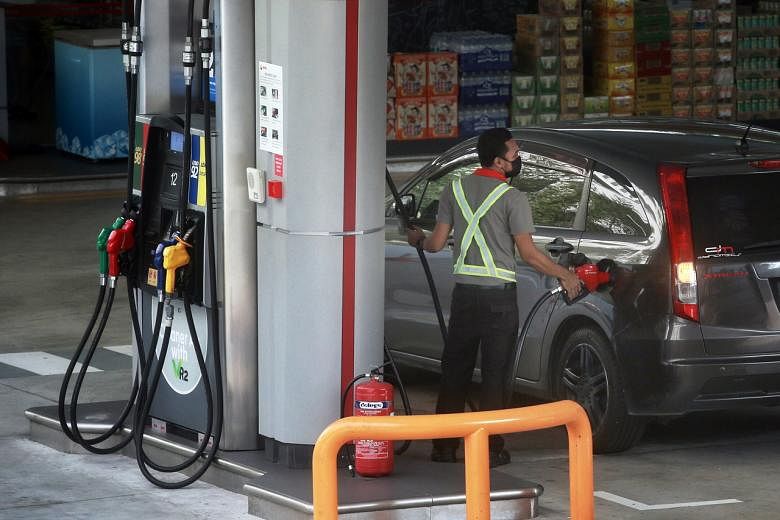SINGAPORE - The recent petrol duty hike is meant to set price signals and change behaviour, rather than to get drivers to switch to electric vehicles (EVs) immediately, said Deputy Prime Minister Heng Swee Keat on Friday (Feb 26).
Responding to MPs like Dr Lim Wee Kiak (Sembawang GRC) and Workers' Party MP Dennis Tan (Hougang), who asked why the petrol duty was raised before the infrastructure for electric vehicles is fully ready, Mr Heng said that this was not the intention of the duty adjustments.
"Just like how we have made deliberate decisions to protect our environment, we want people to make conscious choices about how to drive, how much to drive, and whether to even drive at all," said Mr Heng, who was rounding up the debate on the Budget statement.
EVs are also not the only alternatives to driving, Mr Heng said. Hybrid vehicles are another alternative that are already widely available today. Public transport, too, is being kept affordable and accessible through rail and bus subsidies as well as investments in public transport infrastructure, he added.
Mr Heng also stressed the need for Singapore to protect its environment, noting that climate change and environmental sustainability were not issues that had became priorities overnight.
Such efforts date back decades, including efforts to improve sanitation systems and clean up the Singapore River in the 1960s to 1980s, and to encourage the adoption of cleaner vehicle alternatives as far back as 2001.
"Ultimately, protecting our environment must be our commitment to future generations of Singaporeans. This is just one of the many small but necessary steps in our whole-of-society, multi-generational efforts to preserve our clean living environment," said Mr Heng.
While the recent petrol duty hike would have a bigger impact on those who drive for work, such as taxi and private-hire car drivers, measures have been put in place to mitigate its impact, said Mr Heng.
"I understand the pressure that you are facing, especially during this (Covid-19) situation," the Deputy Prime Minister said, addressing the concerns of such workers that were raised by MPs like Ms Mariam Jaafar (Sembawang GRC) and Mr Darryl David (Ang Mo Kio GRC). "There will never be a good time to raise petrol duty."
To cushion the impact of the hike, which raised the duty for 98-octane petrol by 23 per cent and that for 92-octane and 95-octane by 18 per cent, the Government expects to channel almost all of the increase in duty collections this year back to petrol vehicle owners as offsets, said Mr Heng, who is also Finance Minister.
Those who depend on driving for their livelihood will also be receiving additional petrol duty rebates on top of the road tax rebates that were announced earlier, Mr Heng said.
Taxi drivers will get 15 per cent in road tax rebates in the form of rental reductions between the middle of next month and April. They, along with private-hire drivers, will also each receive $360 of additional petrol duty rebate between May and August, the Land Transport Authority (LTA) had announced earlier.
The taxi operators and Grab Rentals have agreed to pass on the road tax rebates to their drivers, said Mr Heng. Ride-hailing firm Gojek will also introduce additional incentive rebates for their drivers from March. Motorcycle owners will also receive their additional petrol duty rebates from May.
At the same time, such broad-based rebates will not be able to cater to every unique circumstance, or reach those in more informal work arrangements, Mr Heng acknowledged.
"We are working with the labour movement to see how we can provide further help to self-employed delivery workers and limousine drivers," he said.
Mr Heng also said that Covid-19 relief measures have also benefited more than 50,000 taxi and private-hire car drivers. These include schemes like the Self-Employed Person Income Relief Scheme, and the Covid-19 Driver Relief Fund, which was just topped up by $133 million.


